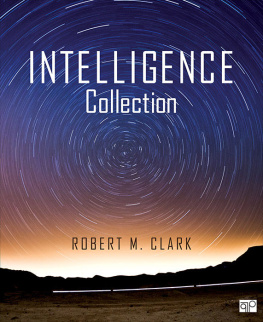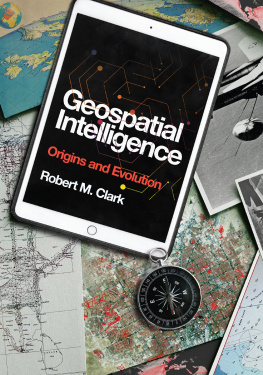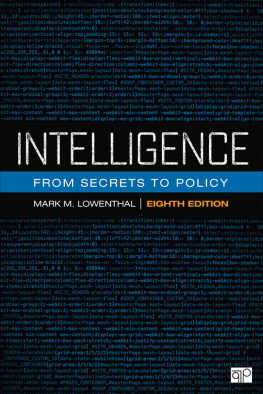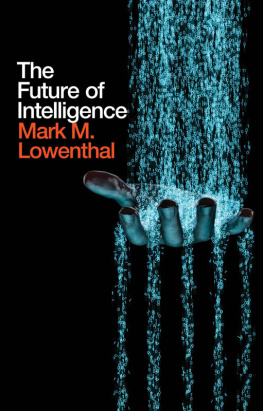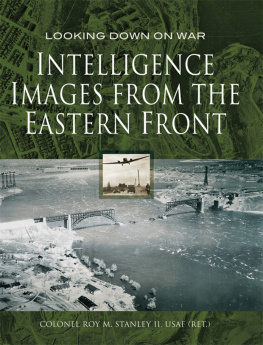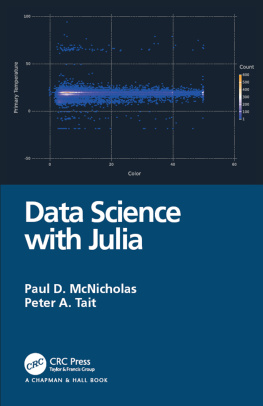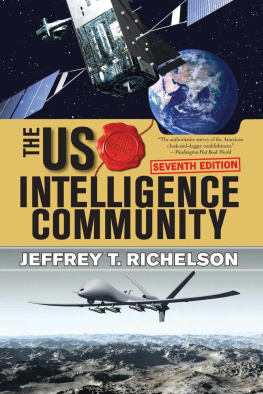

Copyright 2014 by CQ Press, an Imprint of SAGE Publications, Inc. CQ Press is a registered trademark of Congressional Quarterly Inc.
All rights reserved. No part of this book may be reproduced or utilized in any form or by any means, electronic or mechanical, including photocopying, recording, or by any information storage and retrieval system, without permission in writing from the publisher.
Printed in the United States of America
Library of Congress Cataloging-in-Publication Data
Clark, Robert M.
Intelligence collection / Robert M. Clark, University of Maryland
pages cm
Includes bibliographical references and index.
ISBN 978-1-4522-7185-9 (alk. paper).
Intelligence serviceMethodology. I. Title.
JF1525.I6.C57 2014
327.12dc23 2013006588
This book is printed on acid-free paper.
13 14 15 16 17 10 9 8 7 6 5 4 3 2 1

FOR INFORMATION:
CQ Press
An Imprint of SAGE Publications, Inc.
2455 Teller Road
Thousand Oaks, California 91320
E-mail: order@sagepub.com
SAGE Publications Ltd.
1 Olivers Yard
55 City Road
London EC1Y 1SP
United Kingdom
SAGE Publications India Pvt. Ltd.
B 1/I 1 Mohan Cooperative Industrial Area
Mathura Road, New Delhi 110 044
India
SAGE Publications Asia-Pacific Pte. Ltd.
3 Church Street
#10-04 Samsung Hub
Singapore 049483
Publisher: Charisse Kiino
Editorial Assistant: Lauren Johnson
Associate Editor: Nancy Loh
Production Editor: Olivia Weber-Stenis
Copy Editor: Michelle Ponce
Typesetter: C&M Digitals Ltd.
Proofreader: Scott Oney
Indexer: Sheila Bodell
Cover Designer: Michael Dubowe
Marketing Manager: Erica DeLuca
Permissions Editor: Jennifer Barron
Illustrator: ronwilsonillustration.com
Contents
















Figures and Tables
Preface
This book addresses the complete spectrum of intelligence collection. My previous book, The Technical Collection of Intelligence, as the title suggests, is aimed at individuals who need a better understanding of various technical collection disciplines. Intelligence Collection encompasses information from the former but places equal emphasis on nontechnical collection. The text is written at a level that should be understandable and make sense to practitioners in both areas.
Why treat seemingly disparate fields in one text? Because solutions to the most critical intelligence problems today demand that collectors across the board have a basic understanding of each others disciplines. It would be a mistake for readers to imagine that only Part I or only Part II applies to their particular work situation. Collectors need to know how other collectors function in order to help them and be helped in turn. Analysts, as well, have to understand the potential and limitations of collection assets in order to intelligently use them and use the results in solving analytical problems.
The purpose of this book is to
explain specific collection systems, including the potential and limitations of each,
help collectors and analysts to function across organizational boundaries, and
highlight the value of sharing approaches between collection disciplines.
Intelligence Collection discusses how collectors in all disciplines garner the raw intelligence that is used by all-source analysts in finished intelligence production. It will be of value to
professors who teach undergraduate- and graduate-level collegiate courses in intelligence or political science;
collection practitioners and managers who must work cooperatively across collection stovepipesa term widely used in the United States to refer to the specialization and compartmentation practices of collection organizations;
all-source analysts who need to better understand how to task and collaborate with their collection partners and be able to evaluate collection and participate actively in it;
customers of intelligence who need to understand the capabilities and limitations of collection when the results are cited to support intelligence conclusions; and
recruiters for the intelligence community who bring in the talented people who develop collection systems and engage in collection activity.
This book is intended to serve these readers as a reference, or for university students, a textbook on intelligence collection. It covers terminology and important issues in collection performance and its utility for intelligence. It focuses especially on the function and process, to include single-source analysis of collected material. It does not go into the of such information. That subject is covered in a companion book, Intelligence Analysis: A Target-Centric Approach.
A Few Basic Definitions
All intelligence collection disciplines have their specialized jargon, or shorthand for communicating concepts. Some of these terms are explained in the appropriate chapters of this book, and many additional terms are included in the Glossary. A few terms are common to almost all collection, and their definitions are given below.
Raw versus finished intelligence: The end product of intelligence collection is referred to as raw intelligence. Finished intelligence is the term customarily applied to the product of all-source analysis (described below).
Collection: This term has two meanings in practice, and both meanings are used in this book. It can mean the entire process, from the planning stage to the dissemination of raw intelligencewhich is the meaning that is applied in this books title. Or it can mean one step in the process where information or something else of intelligence value is physically acquired. The context usually signals which meaning is relevant.
INTs: Collection disciplines are often called INTs as shorthand, because they have a common suffix, for example, COMINT, ELINT, and HUMINT. This practice has led to many terms, some half-serious, for specialized collection and analysis techniques; so terms such as TrashINT appear in this book.
Next page
